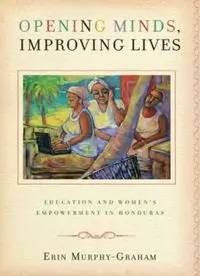
Opening Minds, Improving Lives: Education and Women's Empowerment in Honduras PDF
Preview Opening Minds, Improving Lives: Education and Women's Empowerment in Honduras
O P E NIN G MIND S, IMPROVING LIVES O P E N I G M D S I D P S , M R O D V L O R � M , O � R O D G S D S � M D P E � I L OP E NIG P M D S ,R P V D V G Opening Minds, Improving Lives Opening Minds, iMprOving Lives Education and Women’s Empowerment in Honduras Erin Murphy-Graham Vanderbilt University Press Nashville © 2012 by Vanderbilt University Press Nashville, Tennessee 37235 All rights reserved First printing 2012 Tis book is printed on acid-free paper. Manufactured in the United States of America Library of Congress Cataloging-in-Publication Data on fle LC control number 2011023326 LC classifcation LC1811.M87 2012 Dewey class number 371.822 ISBN 978-0-8265-1828-6 (cloth) ISBN 978-0-8265-1829-3 (paper) In memory of Eleanor Cavanaugh Murphy, 1923–2009 Virginia Hunter Ring, 1917–2010 With joy that you are free from the fetters of this world Contents Acknowledgments ix Introduction 1 1 On Gender, Education, and Empowerment 9 2 SAT as Empowering Education 30 3 “SAT Came to My Feet, It Came to My Doorstep”: Understanding the Context of SAT Implementation in Honduras 51 4 “My Mind Is Diferent”: Developing Confdence and Critical Perspectives through SAT 71 5 Taking Life by the Reins: Steps toward Self- and Social Betterment 93 6 Behind Closed Doors: Examining the Infuence of Education on Women’s Intimate Relationships 110 7 Conclusion 133 Epilogue: SAT in Africa (with Joseph Lample) 153 Appendix: Examples from SAT/PSA Textbooks 169 Notes 195 Works Cited 199 Index 211 Acknowledgments Twelve years ago I volunteered to participate in a two-week evaluation of the SAT—Sistema de Aprendizaje Tutorial (Tutorial Learn- ing System)—program in Honduras. My assignment during the evalua- tion was to explore the ways in which the SAT program empowered women. Tis took me much, much longer than two weeks, and many people helped along the way. First, I am deeply indebted to the women and their families who agreed to participate in this research. Tey trusted me with their stories, and I hope I have faithfully shared their views and experiences. Tey wel- comed me into their homes, and they believed enough in the importance of this project that they were willing to share sensitive personal informa- tion that highlights the complexity and contradictions of the empower- ment process. Gracias por las tajadas, las siestas en sus hamacas, las risas que compartimos, y más que todo su confanza y amistad. I especially thank Leonidas Tomas and Lourdes Lino Mejia for letting us stay in their extra room and feeding us many delicious meals. Tank you to the members of BASED-UK, particularly Michael Rich- ards and Geeta Gandhi Kingdon, who supported my frst visit to Hon- duras, and to Marcia Bernbaum, the team leader of the frst SAT evalua- tion. Te staf at Bayan, particularly Soheil Dooki, Alejandro Martínez, and Ricardo Edén, spent countless hours answering my questions to help me understand the history of SAT in Honduras. I am also grateful to the Dooki family for hosting me on multiple occasions during my stays in La Ceiba, and for welcoming and protecting me like a fourth daughter. I thank Azarnoosh Dooki for transcribing the interviews. I would like to thank faculty members I worked with at the Harvard Graduate School of Education, including Fernando Reimers, Suzanne Grant Lewis, Pedro Noguera, and Carol Weiss. I am particularly thankful to Carol, whose mentorship and friendship were a sustaining feature of my fnal two years in graduate school. My dear friends from the Harvard Graduate School of Education, Sonya Anderson, Dorinda Carter, Allison ix
